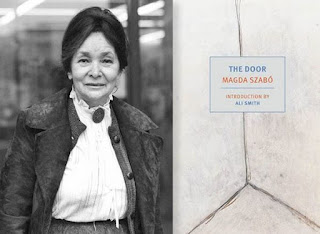This is an odd book. It recounts the growth and end of an intense relationship between a wishy-washy writer and her traumatized and autocratic cleaning lady. It was was first published in Hungary in 1987 and arose in an atmosphere of intermittent but ever-present government oppression. Szabó, like the writer in the novel, endured a career fluctuating among prizes, forced appearances, and banned books -; on one occasion a prize and the book banned on the same day.
The cleaning lady, whose name is Emerence, is a fully drawn and haunting character. Her path to working for the writer began and continued in a series of traumas, such as her two siblings dying before her eyes as young adolescent and her traumatic self-sacrifice in presenting an abandoned Jewish baby to her conservative village as her own. Her life suggests the essential life of citizens under an arbitrary and autocratic regime.
In the book, the author slowly doles out knowledge of Emerence's traumatic past step by step as it is discovered by the writer, who fails to be inquisitive in the face of Emerence's perennial proud silence. Their relationship, as they finally acknowledge, is like mother and daughter and a model of autocratic parenting. At one point Emerence says that if someone is to love her, she must love her alone, although she tolerates the writer's husband, as he tolerates her. Finally Emerence's becomes ill and wants the world to allow her to die, which the writer at first prevents and then implements. Pages after Emerence's death provide a satisfying, adagio coda.
The prose suffices but is not striking.
Whereas the development of Emerence is full and vivid, the account of the writer is tenuous —: for example we don't know what she writes, nor do we know what if anything in her history allows her to submit to this relationship. A community of secondary characters is well drawn as far as they revolve around Emerence and are illuminated by her attitude toward them.
These unpleasant characters with an ugly, quasi-parental relationship limited my enjoyment of this novel but set me thinking of other works with similar situations that I like. What's the difference? Take St. Aubyn’s Patrick Melrose novels. Emerence is empathetic, selfless, and cuddly compared to protagonists parents. Yet I enjoy and respect the book. One reason is St. Aubyn’s page after page of exquisite prose. Another may be Patrick carves out a sort of mental health. I wondered if the tone of the part of The Door after Emerence’s death is somehow equivalent to Melrose' eventual recovery? In some way it allows us to recover.
Patrick has suffered from trauma and like many victims of trauma his bundle of self constantly threatens to disintegrate, whereas Emerence holds herself stiff and tight. In a long scene in the second novel when he is heavily laden with assorted drugs, Patrick's bundle of himself unravels into myriad voices rather like Leopold Bloom's trial in Ulysses and the issue of coherence of self continues through the books. Is Patrick's shaky self-cohesion more sympathetic for the reader than Emerence’s almost heroically stiff self-control?
Or take King Lear. Lear is an unpleasant character who has terrible relations with his children, but I love and admire the play. In the course of the play Lear changes his perspective on things. It seems integral to Emerence that she does not change her perspective; she would attack anyone who suggested she might. It is part of her holding herself together tightly. But what kind of book would we have she did?
Or Dorothy Sayers' Peter Whimsy mystery novels. Lord Peter comes from the same social world is Patrick Melrose and likewise suffers from a history of trauma, in his case from the First World War. His gentleman’s gentleman, Bunter, plays a role in most of the novels and stories, sometimes a dominant one. Of, Bunter, Whimsy's mother says, "It's that wonderful man of his who keeps him in order...so intelligent...a perfect autocrat." Yet the novels are engaging. Lord Peter is more attractive than the writer in The Door, the plotting is more intriguing, and Bunter has subtlety in how he controls Lord Peter. Maybe most important, Bunter has Whimsy's best interests at heart whereas Emerence is uncompromisingly self-centered.


No comments:
Post a Comment